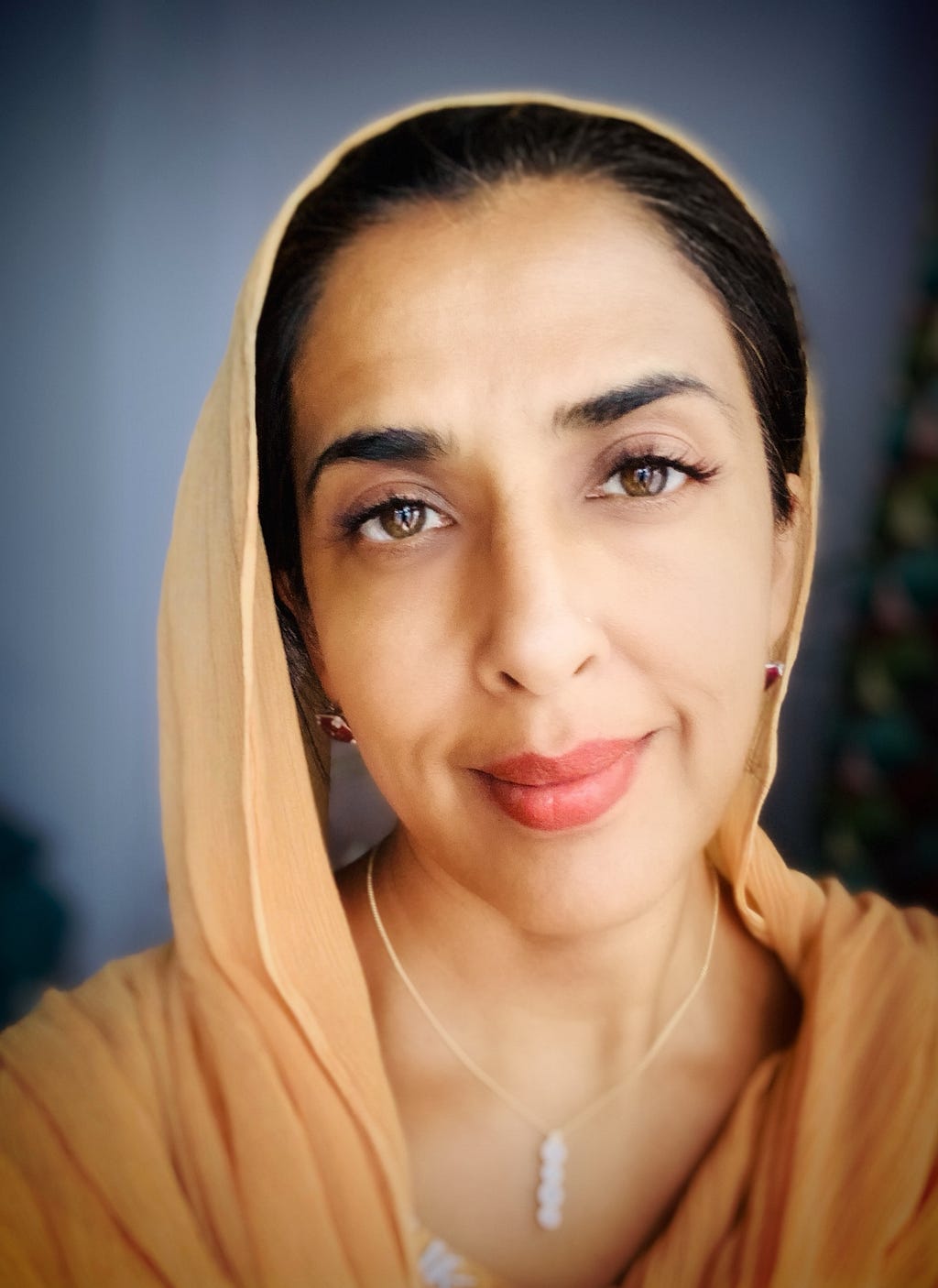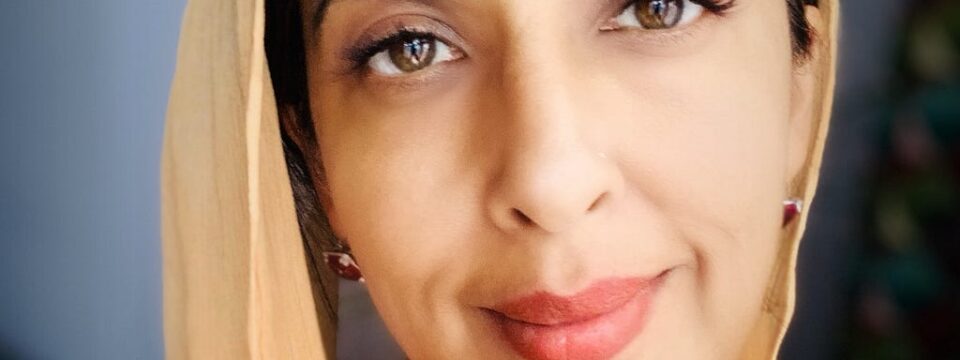Social Impact Authors: How & Why Author Dr Zareen Roohi Ahmed of Gift Wellness Is Helping To Change Our World

Leadership, to me, is the art of illuminating paths, not personalities. A true leader casts the light on a cause, inviting collective effort, rather than seeking personal accolades. It’s about empowering others to shine and ensuring that their shared mission outlasts their own tenure.
As part of my series about “authors who are making an important social impact”, I had the pleasure of interviewing Dr Zareen Roohi Ahmed,
Dr Zareen Roohi Ahmed is the founder and CEO of Gift Wellness, a social enterprise which produces a range of sustainable, natural, high-quality sanitary products . She is also the founder and Chair of The Halimah Trust, a charity, founded in honour of her daughter, that works to improve the lives of orphaned and needy children through education and responding to the needs of people in crisis. In the past, Zareen has worked on other projects such as spearheading urban regeneration initiatives and representing Britain on foreign office delegations as CEO of the British Muslim Forum.
Zareen’s new book, The Gift, tells the remarkable story of how, after the tragic loss of her daughter Halimah, Zareen channelled her grief into real action and purpose, all in the name of improving the lives of women and girls across the globe. It covers Zareen’s experience establishing The Halimah Trust, building schools in Pakistan, creating her pioneering line of sustainable period products, and the importance of championing women’s voices.
Thank you so much for joining us in this interview series! Before we dive into the main focus of our interview, our readers would love to “get to know you” a bit better. Can you tell us a bit about your childhood backstory?
Growing up in Stourbridge, England, as the child of Pakistani immigrants, I experienced a tapestry of cultural richness. My parents carried the heart of Punjab with them, nurturing us in a home where Pakistani tradition and British modernity harmoniously coexisted. From a young age, I was exposed to diverse musical landscapes, sartorial expressions, and culinary traditions.
Despite facing the challenges of racism in a predominantly white community, my family’s resilience and my role as a protector for my younger siblings shaped me into the person I am today. We were wealthy in love and values, with our parents instilling in us the principles of generosity and abundance, despite any material lack. This upbringing has deeply influenced my perspectives and ambitions.
When you were younger, was there a book that you read that inspired you to take action or changed your life? Can you share a story about that?
My passion for English literature was ignited by Mrs. Blakemore, an educator who could rival the eccentricity of Dickens’ characters. It was in her classroom that “Great Expectations” became more than a novel; it became a lens through which I understood adversity and compassion. The poignant themes of poverty, rejection, and discrimination, countered by the power of love and kindness, resonated with my own experiences. It inspired me to believe in change and the transformative power of empathy. This novel, with its profound humanity, sowed the seeds for my later work in social entrepreneurship and advocacy.
It has been said that our mistakes can be our greatest teachers. Can you share a story about the funniest mistake you made when you were first starting? Can you tell us what lesson you learned from that?
One of the earliest, most eye-opening mistakes I made was assuming that the need for menstrual products in emergency aid was self-evident. When our first shipment arrived, I eagerly contacted a local charity to donate to a Syrian refugee camp, only to be dismissed as they were collecting only “vital” items. It was a moment of disbelief and a clear indicator of the widespread ignorance surrounding menstrual health.
Confronting the charity organiser with the harsh realities faced by women in crisis was a turning point. It wasn’t funny at the time, but looking back, the naivety of that situation is almost comical. The lesson was clear: change begins with conversation. Since then, I’ve been dedicated to educating aid organisations about the essential nature of menstrual products, leading to a significant shift in how emergency aid is perceived and distributed.
Can you describe how you aim to make a significant social impact with your book?
My book, ‘The Gift’ isn’t just a personal narrative — it’s a blueprint for converting sorrow into societal change through social entrepreneurship. Its aim is to ignite a movement where personal adversity becomes a driving force for social good. By sharing my story, readers are shown how to channel their grief into creating positive change, especially in the realm of social business.
The book is designed to inspire action by demonstrating the viability of purpose-driven businesses that prioritise social equity and impact alongside profitability. It’s about teaching resilience, the importance of a strong mission, and the transformative power of social enterprise. Readers will learn how to build brands that not only survive but thrive by resonating on a deeper level with consumers. Through ‘The Gift’ I strive to show that anyone can turn their pain into a meaningful and impactful venture that tackles social issues head-on.
Can you share with us the most interesting story that you shared in your book?
One compelling story I share in ‘The Gift’ details the discrimination I faced as a woman of colour in the corporate retail sector. It was a poignant moment when, during a meeting with a buyer from a major retail chain, my identity visibly clashed with her expectations, leading to blatant disregard for my product. Despite my company offering innovative menstrual products with a philanthropic angle, the buyer’s initial excitement evaporated upon meeting me, an Asian woman in a headscarf. Her demeanour changed from enthusiasm to indifference, suggesting my brand’s novelty and my personal background as barriers.
However, after confronting the issue and receiving an apology, we engaged in a fruitful dialogue that led to my products being considered for their shelves. This experience was not only a testament to the biases that persist in business but also highlighted the resilience and determination required to overcome them. It serves as a vivid example of the challenges faced by minority entrepreneurs and the importance of standing firm in one’s values and vision.
What was the “aha moment” or series of events that made you decide to bring your message to the greater world? Can you share a story about that?
The “aha moment” came during a quiet reflection at Lahore airport after inaugurating the school built in memory of my daughter. Reading about the dire conditions of Syrian women in refugee camps, I was struck by a profound realisation of my next mission: to help these women through a business. The vision was clear — I would distribute sanitary pads, funded by my product sales, to empower these women and restore their dignity.
Despite the enormity of the challenge, my determination was solidified during the homeward flight. Envisioning the project, I scribbled notes obsessively, driven by the need to make a tangible difference. This passion to help was not just an extension of my charity work but an embodiment of my daughter’s legacy. This defining moment steered me towards a purposeful path, leading to the creation of a social enterprise that would provide aid through commerce, a concept that became the heart of my book.
Without sharing specific names, can you tell us a story about a particular individual who was impacted or helped by your cause?
Soon after we launched the Gift Wellness Foundation, our period poverty charity, I can recall the mother of a young student who discreetly approached us after an event we held called the Period Poverty Forum. Afflicted with severe menstrual pain due to endometriosis, her daughter was using standard products that exacerbated her discomfort. Upon trying our Gift pads, her relief was profound — the pain and symptoms reduced noticeably. This transformation allowed her to attend school with newfound confidence. Her story became a testament to the impact of our cause, reinforcing our commitment to providing healthier menstrual solutions for all women.
Are there three things the community/society/politicians can do to help you address the root of the problem you are trying to solve?
- Politicians should legislate for the free provision of menstrual products in public spaces, aligning menstrual equity with health and dignity.
- Education systems must engage all genders in menstrual education, fostering a society free of stigma and taboo.
- Employers should normalise workplace provision of menstrual products, ensuring dignity and fostering an inclusive environment.
How do you define “Leadership”? Can you explain what you mean or give an example?
Leadership, to me, is the art of illuminating paths, not personalities. A true leader casts the light on a cause, inviting collective effort, rather than seeking personal accolades. It’s about empowering others to shine and ensuring that their shared mission outlasts their own tenure.
What are your “5 things I wish someone told me when I first started” and why? Please share a story or example for each.
- Embrace Imperfection: Perfection is elusive; what matters is progress and learning from mistakes.
- Seek Feedback: Honest feedback is invaluable. It grounds your vision in reality and opens avenues for improvement.
- Pace Yourself: Change is a marathon, not a sprint. Taking care of your well-being is crucial for sustained impact.
- Value Relationships: People are the pillars of any endeavour. Nurturing relationships is pivotal for success.
- Expect Resistance: Pushback is a sign you’re challenging the status quo. Stay resilient and true to your mission.
Can you please give us your favourite “Life Lesson Quote”? Can you share how that was relevant to you in your life?
“My heart is at ease knowing that what was meant for me will never miss me, and that what misses me was never meant for me.” This quote is my guiding beacon, reminding me that the journey is as important as the destination and that there is a hidden wisdom behind every twist and turn of life.
Is there a person in the world, or in the US with whom you would like to have a private breakfast or lunch with, and why? He or she might just see this, especially if we tag them. 🙂
I’d cherish a meeting or interview with Mo Gawdat. His journey of transmuting personal loss into a catalyst for global happiness and his views on mindful technological advancements resonate deeply with me. A collaboration could amplify our mutual endeavours to heal and inspire others.
How can our readers further follow your work online?
I invite readers to engage with us through our website, where our mission, stories, and the tangible impact of our products are shared. Join our community on social media platforms, where we provide updates and insights into our ongoing projects and initiatives. Let’s connect, share, and grow together for a healthier, more equitable world. www.giftwellness.co.uk
This was very meaningful, thank you so much. We wish you only continued success on your great work!
Social Impact Authors: How & Why Author Dr Zareen Roohi Ahmed of Gift Wellness Is Helping To Change… was originally published in Authority Magazine on Medium, where people are continuing the conversation by highlighting and responding to this story.
